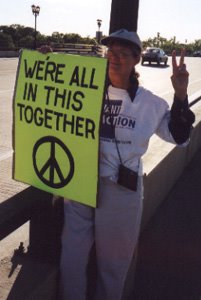Without doubt, such documentaries serve as important historical testimonies to events which, in many ways, were life-changing for both individuals and societies.
Yet the selective choosing of what exactly is focused upon by many of these documentaries is troubling to me.
Yes, I want to hear the stories of loss and bravery, sacrifice and heartache from New York on September 11, 2001. Yet I also want to hear about, for example, the lives and stories of the citizens of Fallujah during the U.S. military's siege of this particular Iraqi city.
Why are some voices given a platform and packaged in sleek, high-tech productions for commercial consumption, while other voices are discounted, ignored, and even denied?
Renowned journalist, author, and filmmaker, John Pilger, offers an explanation by contending that for so-called first world countries to maintain their colonial assumptions, “millions of people [must] remain invisible and expendable.” And it’s these countries, with their often unconscious “colonial assumptions” which set the agenda for “mainstream” news and entertainment, and thus the focus of various types of documentaries.
In the introduction to his 2006 book, Freedom Next Time, Pilger observes that, “On March 28, 2003, during the attack on Iraq, sixty-two people were killed by an American missile that exploded in the al-Shula district of Baghdad. That evening, Newsnight, the BBC’s only regular televised current affairs programme, devoted forty-five seconds to the massacre – less than one second per death. Contrast that with July 7, 2005, when the terrorist bombing of London killed almost the same number of people and received such coverage that overnight we became intimate with the lives of the victims, and could mourn their loss or salute their courage.”
“In other words,” continues Pilger, “for the men, women and children blown to pieces in Baghdad, the solidarity we extended naturally to the London victims was denied; we were not allowed to know them. [ . . . ] Their violent extinction caused not a ripple in that man-made phenomenon known as the ‘mainstream’, the main source of what we call news. [ . . . ] The innocent people killed in London were worthy victims. The innocent people killed in Iraq were unworthy victims. Put another way, the London massacre was worthy of our compassion; the Iraqi outrages were not.”
Thankfully, there are people like John Pilger, Amy Goodman, and many others, who are working to provide forums for the voices of those considered as “not us”, and thus as “expendable” by those who view others’ usefulness only in terms of “our interests”.
And thankfully, too, more and more people are recognizing the limitations of the corporate “mainstream” media and turning to alternative, independent sources for news and information – sources which remind us that . . .

John Pilger’s book Freedom Next Time is published by Bantam Press.
Photo of Minneapolis writer and activist Carol Masters from Faces of Resistance by Michael Bayly.
See also the previous Wild Reed posts The Exception to the Rulers and Taking on Friedman.






















No comments:
Post a Comment